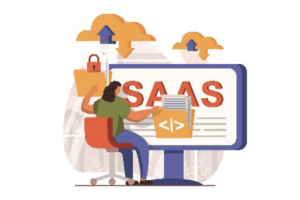Talent management has evolved significantly in recent years, driven by technological advancements, changing workforce demographics, and shifts in organizational priorities. It has transitioned from being primarily administrative to strategic. Organizations now view their talent as a critical asset and a source of competitive advantage. The availability of data and analytics tools has enabled organizations to take a more data-driven approach to talent management. Technology, particularly HR technology platforms like SaaS, has played a central role in this evolution, relieving HR professionals and organizational managers from administrative burdens and improving efficiency in talent processes.
Introduction to SaaS in Talent Management
SaaS stands for Software as a Service. It’s a cloud-based software distribution model in which applications are hosted by a third-party provider and made available to customers over the  Internet. Instead of installing and maintaining software on individual computers or servers, users can access SaaS applications through a web browser or application interface.
Internet. Instead of installing and maintaining software on individual computers or servers, users can access SaaS applications through a web browser or application interface.
SaaS has become increasingly ubiquitous in the workplace over the last decade. The SaaS market is projected to increase 1 to $282.2 billion in 2024 and $374.5 billion by 2028. The pandemic accelerated the adoption of SaaS solutions as businesses rapidly transitioned to remote work and sought digital tools to support collaboration, communication, and business continuity. Today, 80% of companies 2 use at least one SaaS application, and it is expected that 99% will use at least one SaaS solution by the end of 2024.
For HR professionals and organizational managers, SaaS solutions offer new ways to enhance talent management and support efforts to attract and retain highly engaged employees.
Optimizing Onboarding with SaaS Solutions
Talent management is an ongoing process that includes onboarding, evaluation, promotion, and exit interviews.
 Onboarding is a critical time in the employee journey with your company. A great onboarding experience 3 sets a new hire up for success, while a poor onboarding experience can lead to several adverse outcomes. Employees who lack proper onboarding will take longer to become productive, will not feel appropriately integrated into their new team, may become frustrated or pessimistic about their job outlook, and may ultimately start looking for other opportunities sooner rather than later.
Onboarding is a critical time in the employee journey with your company. A great onboarding experience 3 sets a new hire up for success, while a poor onboarding experience can lead to several adverse outcomes. Employees who lack proper onboarding will take longer to become productive, will not feel appropriately integrated into their new team, may become frustrated or pessimistic about their job outlook, and may ultimately start looking for other opportunities sooner rather than later.
Onboarding matters. Software as a service can make good onboarding easier to accomplish. SaaS onboarding solutions offer interactive and engaging experiences for new hires. Through multimedia content, welcome videos, and virtual tours, companies can introduce their culture, values, and expectations to employees before they enter the office. This early exposure helps new hires feel connected to the organization and fosters a sense of belonging.
Advancing Employee Development with SaaS
While recruitment is an urgent need, retaining employees is just as crucial. Employees who don’t see a future with your organization or don’t receive opportunities to learn and grow can quickly become disengaged and seek opportunities to develop their careers elsewhere. Investing in professional development for your employees not only encourages them to stay with you but also gives you the benefit of employees with broader and deeper skill sets.
SaaS solutions provide employees access to a wide range of online courses, training modules, and learning resources tailored to their specific roles, skills, and career aspirations. Through personalized learning paths, employees can take ownership of their development journey and acquire the knowledge and skills needed to excel in their roles.
SaaS solutions also enable organizations to assess employee skills, track learning progress, and identify real-time skill gaps. By leveraging data analytics and reporting tools, HR professionals can gain insights into the effectiveness of learning initiatives and make data-driven decisions to optimize employee development programs.
Transforming Performance Management
Performance management 4 is undergoing a significant transformation with the adoption of SaaS solutions. It is moving from traditional annual reviews to continuous feedback and  development-focused approaches.
development-focused approaches.
SaaS-based performance management tools allow organizations to set clear, measurable goals and track progress toward them in real time. By aligning individual goals with broader organizational objectives, employees gain clarity on expectations and understand how their work contributes to the company’s success.
SaaS platforms enable managers and employees to exchange real-time feedback throughout the year rather than waiting for annual performance reviews. This continuous feedback loop promotes open communication, enhances employee engagement, and facilitates timely course corrections to improve performance.
Enhancing Employee Engagement and Retention
Employee engagement and retention are critical factors in talent management, and SaaS solutions offer innovative tools and strategies to enhance both.
SaaS platforms facilitate communication and collaboration among employees regardless of their location or time zone. Features such as instant messaging, video conferencing, time blocking,5 and virtual workspaces enable teams to stay connected, share ideas, and collaborate on projects in real time, fostering a sense of belonging and camaraderie.
SaaS-based employee engagement platforms enable organizations to recognize and reward employees for their contributions and achievements. From peer-to-peer recognition to milestone celebrations, these platforms provide opportunities to appreciate employees’ hard work and dedication, boosting morale and motivation.
SaaS solutions support continuous feedback and development conversations between managers and employees. By providing regular feedback, coaching, and growth opportunities, organizations demonstrate their commitment to employee development, enhancing engagement and retention.
Conclusion
SaaS has revolutionized talent management practices across organizations, from advancing employee development and transforming performance management to enhancing employee engagement and retention. By leveraging SaaS solutions, companies can streamline HR processes, improve the employee experience, and drive business success.
As technology continues to evolve and innovations emerge, the role of SaaS in talent management will only continue to grow. Organizations that embrace these advancements and adapt their talent management strategies will be better positioned to attract, retain, and develop top talent in today’s competitive landscape.
ENDNOTES
1 50+ Essential SaaS Statistics You Need to Know in 2024 (techopedia.com)
2 46 SaaS Industry Stats and Insights for 2024 | SaaS Academy (www.saasacademy.com)



